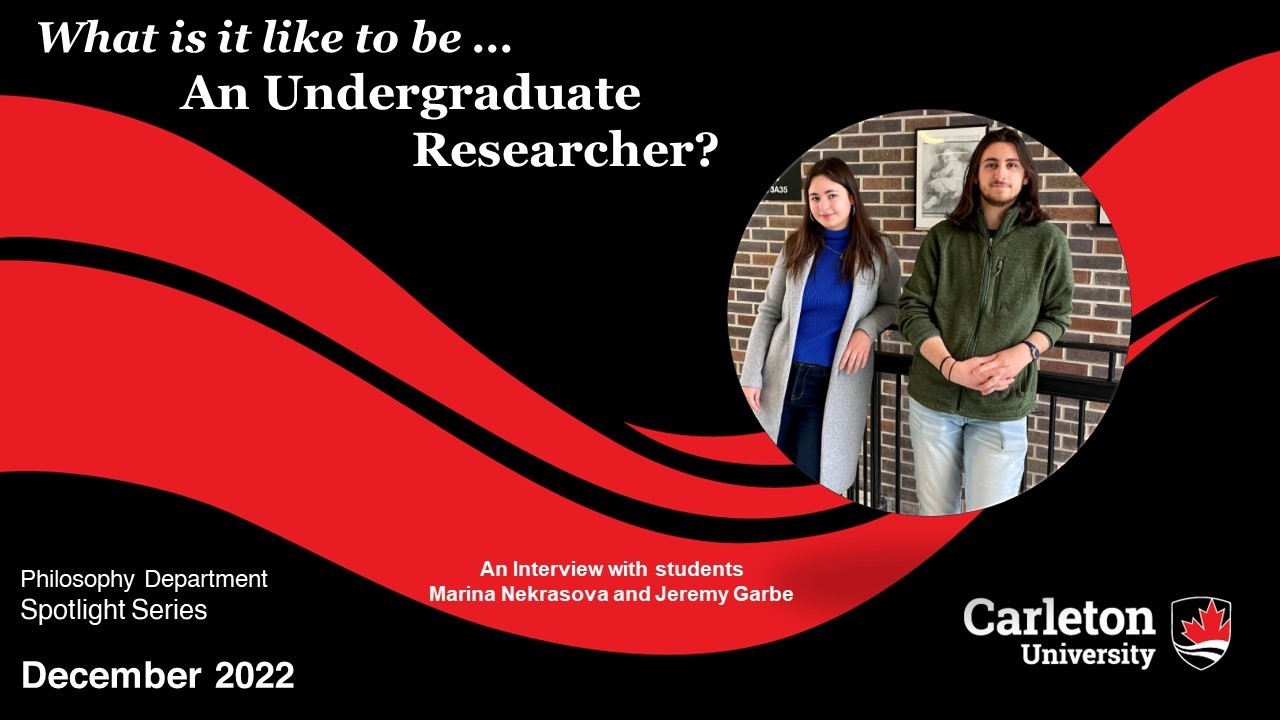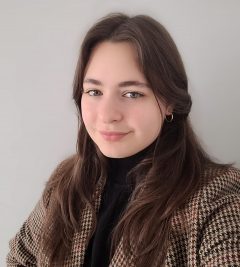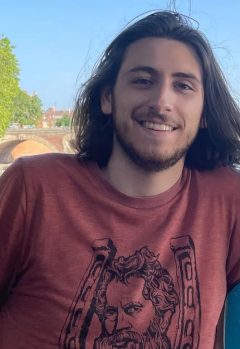What is it Like to be an Undergraduate Researcher? An Interview With Students Marina Nekrasova and Jeremy Garbe

Meet Marina Nekrasova and Jeremy Garbe, two undergraduate students in our department and winners of I-CUREUS awards.
The I-CUREUS program provides undergraduate students with opportunities to work closely with established scholars on a topic they care about and to be paid for that research work. We chatted with Marina and Jeremy to learn about their experience.
Thank you both for joining us. We are so pleased that you’ve pursued the opportunity to conduct research, and, in fact, to be paid for it! Why did you decide to apply?

Marina Nekrasova: While I was conducting research over the past summer for the CUROP Internship, I started to take note of further implications and possible projects that extended beyond a merely theoretical approach to the topic I was addressing. I grew very passionate about my work and wanted to find any means possible to continue my line of research while taking courses. I really enjoyed working under the supervision of Dr. Brook and Dr. Redstone, who provided me with a graduate-school level of guidance. The project I proposed is experimental and highly interdisciplinary. It adopts an approach that I would not be able to pursue in my classes. So when I was notified that the I-CUREUS program was running again during the school year, I took the opportunity to apply.
Jeremy Garbe: I decided to apply for I-CUREUS because I wanted to learn more about the research and writing process at a higher academic level. While I have done plenty of research for my own assignments and projects, I thought it would be fascinating to take more of a supporting role and watch an expert at work while supporting their project in whatever way I could.
The I-CUREUS program is equally funded by Teaching and Learning Services (50%) and the faculty supervisor (50%). What factors contributed to you feeling comfortable enough to approach your respective supervisors about this program? Was it mostly about their research being of interest to you?
JG: I have taken a few of Dr. Bruff’s classes and she has always been extremely helpful and approachable whenever I have any pressing questions. She also has not shied away from asking about her student’s interests and passionately sharing hers. This made me realize that her interests are quite appealing to me and so I decided to approach her to be my supervisor for I-CUREUS, to better understand the academic side of my interests.
How did you collaborate with your supervisor in writing the I-CUREUS application?
MN: I wrote most of the application myself, which was then reviewed by Dr. Brook before being sent off.
JG: Once I emailed Dr. Bruff stating my interest, she suggested that we meet during her office hours to hammer out the details. She then presented me with her current research opportunities and asked if any of them interested me. I would have been happy to collaborate on any of the projects, but it was wonderful to feel included in the decision-making process. Dr. Bruff then wrote a brief proposal of the topic, and we discussed what my roles would be, edited the proposal together, and finally we submitted it.
What has been the most interesting part about the experience of collaborating with a faculty member to contribute to a larger project?
MN: I was fortunate enough to have Dr. Brook agree to supervise my own line of research. The experience, although not always easy, is engaging and highly rewarding. It certainly feels different from conducting research for assignments in class because I am consistently focusing on one study in-depth for a much longer period of time. The most interesting part about working with an expert – or in my case, two – is getting to discuss my findings and ideas with them on a weekly or bi-weekly basis, and feeling their support and interest in my research; thank you Dr. Brook and Dr. Redstone!
JG: I find it extremely fulfilling to know that my research is contributing to a larger collaborative project. It is a little different to be researching with other people’s schedules in mind. I have to make sure that I am managing my time to get my tasks done when Dr. Bruff needs them. The responsibility can be a little daunting at times. I would say that the most interesting aspect of the research is diving into a topic that I may not have much experience in and discovering how fascinating it is. Taking my newfound understanding of it and then meeting with my supervisor and hearing her interpretation of my research pushes me to think of it on a much deeper level than I may have on my own.
What are each of you researching as part of this program and what tasks are you expected to perform?
MN: The purpose of my CUROP study was to provide a theoretical account of why we strive to create conscious, artificial superintelligent systems that exceed the capacities of human intellect. I argued that we possess a drive to have superintelligent beings present in our world, which expresses itself through artefacts that function as something I identify as “symbolic external presentations. This drive has two routes: the aspiration for superintelligent beings in general – whether religious or artificially intelligent – and the aspiration for mechanistic minds of our own invention. These two routes come together to produce our motive to create advanced artificial intelligent systems. This is not to say that religion is inherently pathological, or exclusively a function of our needs, but rather to claim that some presentations of human artifacts like A.I. are perceived as having quasi-religious functions: regardless of whether A.I. ought to be equivalent in esteem as religious beings, they are certainly viewed this way in certain media and New Religious Movements.
Continuing this line of research, my current I-CUREUS research is titled Unconscious Motivations Behind and Reactions to Artificial General Intelligence as Revealed by Psycho-Physiological Reactivity: A Pilot Study Using Experimental Philosophy. In it, I draw on experimental philosophy and experimental psychology to solidify my theory about our motive to create advanced artificial intelligent systems with empirical evidence.
Could you tell us a little more about your method for carrying out this research?
MN: The experimental component of the project will involve conducting research using volunteers by measuring their psycho-physiological reactivity to artifices that are perceived by us as superintelligent beings as depicted by religious works of art in various forms, religiously based language, and anthropomorphic A.I. The data from these measurements based on conscious states will be garnered by the in vivo use of heart rate variability (HRV), a form of biofeedback which accesses the peripheral nervous system using a non-invasive infrared probe. The data will be correlated with information gathered from responses to sets of surveys designed to detect subconscious inclinations and biases towards the same subject matter.
How about your research tasks, Jeremy?

JG: I have had a few tasks throughout the program that span multiple disciplines. I have researched Jewish critical theorist Max Horkheimer’s interpretations of Jesus Christ and Christianity, comparing this with the views of the Christian theologian Jürgen Moltmann. I have also researched Horkheimer’s critique of Hegel and objective reason, and looked into Marc Chagall’s paintings depicting the crucifixion of Jesus Christ as well as the similarities between the representations of suffering in Horkheimer, Moltmann, and Chagall. My main tasks are to read and synthesize primary and secondary sources that inform the project as a whole and to attempt to link all these topics with each other, with each task building upon the last. I then present my findings to Dr. Bruff and we discuss the relevance of my findings to the project as a whole. Dr. Bruff hopes to analyze the relationship between the perspectives of Horkheimer and Moltmann on suffering by looking at their interpretations of Jesus Christ mediated through Marc Chagall’s crucifixion paintings.
How does this research topic link to previous coursework you both have done or any general philosophical interests you have?
MN: The topic I am working on is directly linked to my primary philosophical interests. I am fascinated in how we perceive artificial intelligence, both actual and hypothetical (i.e., artificial intelligence portrayed in literature, media, and popular culture) and in exploring relationships between A.I. and religious studies. To be more specific, I am interested in how artificial objects of our own creation (especially objects that aim to resemble us) and our paired perceptions of those objects reveal important philosophical and psychological aspects of our nature.
Previously, I have only taken one course related to A.I., which was Dr. Redstone’s First Year Seminar called “Minds and Machines.” The inspiration I felt toward the content taught fostered my conviction that this is the field I want to pursue throughout and beyond my undergraduate degree. I first began to develop my research ideas in that class in a term paper called “The Apotheosis of Strong Artificial Intelligence,” which served as an early blueprint for the research I would then undertake in my CUROP internship. Since my interests also lie in the portrayal of A.I. in the media, I find that I am able to keep thinking about the implications of my research even while partaking in leisurely activities, such as reading and watching science fiction – an absolute goldmine of philosophical issues.
JG: I have taken a course on 19th century philosophy with Dr. Bruff where we spent a substantial amount of time on Hegel so that has helped unravel his language. I will also be taking her seminar in the winter on Dialectic of Enlightenment by Max Horkheimer and Theodor Adorno and this research on Horkheimer has piqued my interest in the full breadth of his thought. I have also been able to make extensive use of my experience with art history and religion that I have gained through the Humanities program. It has been fascinating to have the opportunity to blend all of these disciplines together and use some of the skills I have developed in my previous courses to get the most out of my research.
What is an obstacle you have encountered in conducting this research and how did you overcome it?
MN: While there is a decent number of studies discussing similarities between our perception of A.I. and of monotheistic western deities, most don’t take the approach I am looking for. It has taken me longer than expected to find sources directly related to my topic. This involved reading in different fields outside of philosophy such as psychology, cognitive science, art history, religion, and anthropology. Looking to neurotheology, for example, a field that studies the relationship between religious experiences and neural states, helps a lot in understanding how to approach my project in a multifaceted manner.
JG: One obstacle that I always have to tackle is time management. It can feel difficult to find time for research especially when you are already researching for essays and exams. At a certain point everything starts to blend together. I think this experience has made me much better at organizing my goals and carving time out of my schedule to satisfy all of my obligations and I have learned how to combine aspects of my studies with my research enough for me to feel like I am improving on both fronts
Do you think the I-CUREUS experience will help you in carrying out research in the future and possibly with your future coursework, including writing papers?
MN: Definitely. I find myself not only advancing my research and writing abilities with every draft of work I hand in, but enhancing transferable skills such as time management. In comparison to conducting a larger and more demanding project that requires great attention to detail, class assignments seem relatively less intimidating than in my first and second year of university.
JG: The fact that the work is for a supervisor raises the stakes and ensures that my output is as best as I can make it. This will certainly have an impact on my independent studies.
How do you see this research experience as helping you further graduate school prospects or careers?
MN: I am very interested in pursuing graduate studies in the field of Philosophy of Artificial Intelligence. Since my degree type (Humanities and Philosophy, combined honours) does not provide me with the opportunity to conduct experimental research, my participation in I-CUREUS gives me the opportunity to strengthen my candidacy for graduate programs I am interested in through an experimental research experience.
JG: This research is giving me the opportunity to hone my research and writing skills to a higher standard under the constant and informative supervision of a professor. This kind of experience will translate into everything I do in the future, whether it be writing grant proposals, papers, or researching any number of topics. I feel confident that if I am met with a topic that I do not know much about, I will be able to study it on my own and gain a confident understanding of it. These soft skills will continue to be valuable no matter what I do in the future.
Thank you both again for talking to us! To close, what would you say to other undergraduates who are considering applying for this program or other similar paid research opportunities?
MN: I would definitely encourage other students interested in research to apply for this program or other programs similar to it. We are very lucky to have such opportunities available to undergraduates at Carleton.
JG: I would say that if you are thinking of applying, go for it! The experience of applying alone is valuable and it will help you to build relationships with your professors that can make you feel more confident reaching out for help with any number of things down the line.
Thanks to both students for answering our questions! You can find more about the I-CUREUS program on its page on Carleton’s website. Carleton’s Bachelor of Humanities program has also written a short piece on Marina Nekrasova, which you can see here. Keep an eye out for our next Spotlight coming February 2022!
Have something to share with the Carleton Philosophy community? Fill out our news submission form.
